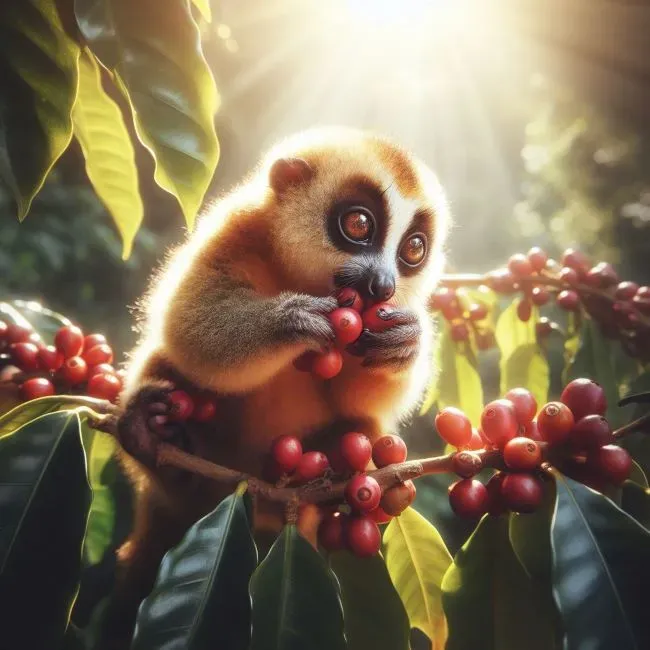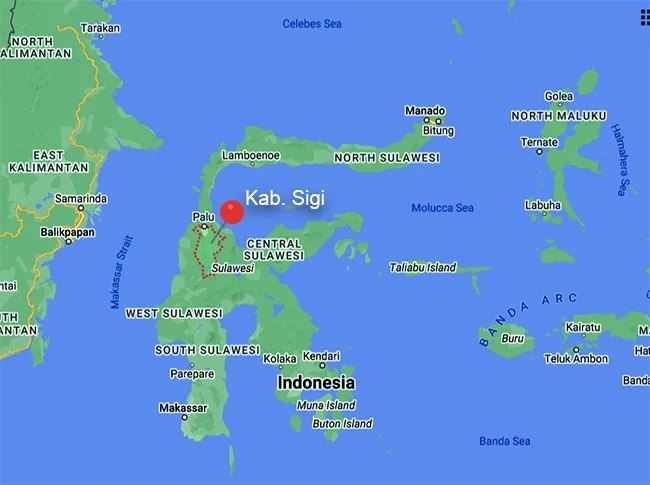 |
| Dates are eating coffee beans. See Coffees image |
The difference between Toratima and Kopi Luwak
In a world enchanted by the allure of civet
coffee, emerges a brew akin yet distinctly different, equally exquisite and
exotic. Its name: Kopi Toratima, a hidden treasure still eluding the radar of
most travelers.
What sets it apart from the famed civet coffee?
Kopi Toratima is born through the alchemy of bats, Tanggali (strigocuscus celebensis), and squirrels.
These creatures serve as fermenters, feasting on ripe coffee beans, crushing
and swallowing the sweet coffee cherries. The beans, having shed their outer
layers, are then regurgitated onto the earth. These, my friends, are the
cherished beans, meticulously gathered, cleansed, and poised for the roaster.
Your senses will dance as you catch a whiff of its fragrant dance during the
roasting and grinding. As for the taste, don't even ask; it eclipses ordinary
plucked coffee by a hundredfold.
Introduced on a grand scale by the Karsa
Institute, a Civil Society Organization based in Palu, in March 2016, the
Toratima Festival was graced by Sigi's dignitaries, heads of local government
units, members of the Regional People's Representative Council from Central
Sulawesi, journalists, backpackers, cross-country bikers, and, of course,
coffee connoisseurs from all corners of Indonesia. Not a trifling number, with
over 3500 attendees, all savoring the essence of Toratima from 19 villages that
partook in the festivities.
According to Bupati Sigi Mohamad Irwan, in
terms of economic statistics for Sigi Regency in 2015, the production of
Pipikoro coffee stood at a modest 152 tons annually, harvested from the 639
hectares of coffee gardens tended by the locals. However, in terms of
productivity, he proudly proclaimed that Pipikoro's coffee plantations outshone
the rest of Sigi Regency.
 |
| Sigi Regency is located where the villages produce Toratima coffee |
The limited accessibility to these villages has been a stumbling block in acquainting the world with this liquid gold. An iccofeereview expedition to the villages of Porolea, Lawed, and Peana took an arduous seven-hour journey from Palu City to reach its destination. From Palu, you'd ride a four-wheeled vehicle to the capital of Gimpu District. Then, it's an ojek ride, traversing mountains and steep valleys for another four hours, arriving at the altitude between 500-1200 meters above sea level where the Toratima coffee gardens thrive.
Once upon a time, Toratima was not commercially
available. It was a treasure reserved for the farmers themselves, presented
with utmost respect to honored guests, and served during customary ceremonies
of the Kulawi Uma and Topo Uma communities.
The production of Toratima remains limited
and seasonal, but for those impatient to savor its magic, you can indulge in
Caffe Toratima at Mutiara SIS Al-Jufrie Airport in Palu City, or better yet,
venture directly to the villages that cultivate this gem in Sigi Regency,
Central Sulawesi.
In the embrace of each Toratima sip, one
discovers not just a beverage, but a legacy steeped in tradition and nurtured
by nature's finest. Let its essence touch your soul, and may the rich tapestry
of its flavor linger in your memory forever.
In the heart of Sulawesi, amidst the whispers of coffee-laden hills, two gems emerge, each with a story as unique as the land that cradles them. Toratima and Luwak, names that evoke a symphony of flavors and emotions.
Toratima coffee Vs. Luwak coffee
Picture this: Toratima, a brew kissed by moonlight and nurtured by the flutter of wings. It's a dance of nature's fermenters – bats, rats, and squirrels. They feast on the ripest cherries, embracing them with a sweetness that lingers. The beans, reborn, emerge from their natural alchemy, pristine as pearls. The aroma, a siren's call, beckoning you to witness the transformation in the roaster's embrace. And the taste? Oh, it's a revelation, a crescendo of flavor that eclipses the ordinary.
Now, turn your gaze to the legend, Luwakcoffee. It's a tale of civets, nocturnal artists, whose palates discern the finest. They select, they savor, and nature's course takes hold. What emerges is a bean, kissed by their discerning taste, anointed by the wild. The hands that pluck them from the earth do so with reverence, for they know they cradle something extraordinary. Roasted and ground, the aroma tells a story of nocturnal wanderings and moonlit feasts. And the taste? It's a revelation, a symphony of flavors that transcends the ordinary.
What sets them apart? It's in the hands that nurture them, in the creatures that leave their mark, in the alchemy of nature's embrace. Toratima, a secret whispered among hills, a treasure yet unveiled. Luwak, a legend that graced coffee cups before the world took notice.
In each sip, you taste not just coffee, but
the essence of a land, the whispers of creatures, the legacy of tradition. They
are more than beans; they are stories, waiting to be savored, waiting to be
shared. Each cup is an invitation to embark on a journey, to taste the passion
and artistry that nature, in its wisdom, bestows upon us.



.webp)



.webp)

